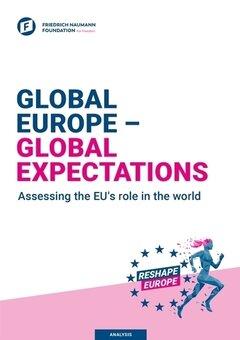Reshaping Europe
How to strengthen ASEAN - EU relations:

© Unsplashed | Mimi Thian
Since the start of the COVID-19 pandemic, the international community has increasingly seen, on the one hand, a rise of authoritarianism and, on the other hand, a backslide of democratic principles and practices – especially in Southeast Asia. The 45 years of partnership between the EU and the Association of Southeast Asian Nations (ASEAN) has been challenged by these developments. The negotiation for deeper strategic and economic engagement between ASEAN and EU has been halted due to technical disagreements and diverging understandings of human rights and democratic values. Initiatives and mechanisms have to be developed in order to bridge these gaps, reinvigorate democratic norms and enable gains for both sides.
FNF, in partnership with Asia Centre, will organise a hackathon to allow young participants to initiate policies, projects or campaigns to improve the relationship between the two blocs.
Sixteen teams (consisting of two youths) across Southeast and East Asia will develop and present their ideas in the hackathon to judges, and the public. The winning team of this regional hackathon will be invited to attend the FNF Annual Conference in Berlin, Germany to present their initiatives with distinguished political decision makers.
Our Objective
We want to encourage and support youth participation in strengthening the relationship between the EU and ASEAN.
Please Note:
The Hackathon will take place in Bangkok, Thailand. Chosen participants from across Southeast and East Asia will be sponsored to join the event. FNF Southeast and East Asia will provide an economy round-trip flight and 3 nights’ accommodation for overseas participants.
In addition, the winning team will also be sponsored to present their idea in Berlin, Germany.
Requirements
- Participants must be between 18-25 years and form a team of 2 individuals.
- Participants must be from FNF project countries in Southeast and East Asia, Thailand, Myanmar, Indonesia, Malaysia, Vietnam, Philippines, Korea and Taiwan.
- We encourage diversity of gender, race and religion
Event Format
A three-day event to give participants knowledge of the EU’s global position and challenges in Southeast Asia and work on potential ways to move forward.
- Day 1 will provide orientation to all participants. They will be briefed about the relationship between the EU and ASEAN by experts in international affairs, academics, and journalists, among others.
- Day 2 will see participants work on their initiatives. The participants will have the opportunity to discuss their ideas with experts and mentors.
- Day 3 will allow participants to continue their work in the morning and be the hackathon – a public event – in the afternoon where participants will present their initiatives to judge and the public. The announcement of the winners will be made on the same day.


